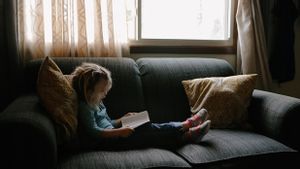JAKARTA - Husband and wife couple Arie Kriting and Indah Permatasari shared their experiences of fasting ahead of the second month of Ramadan together, after the couple married in January last year. At the time of dawn, Arie admitted that he often cooks and prepares food because his wife, Indah, finds it difficult to get rid of the drowsiness when she has to wake up early in the morning.
"It's usually me who cooks for sahur, the problem is that Miss usually wakes up for sahur, but she usually wakes up when she wakes up, she's very sleepy, sleepy. So usually I'm the one who cooks," said Arie, quoted from ANTARA, April 1.
The menu eaten for sahur, said Arie, is easy-to-make dishes and drinks, such as white rice, instant noodles, fried fish, fried eggs, clear vegetables, and warm sweet tea. Arie himself prefers to cook a simple menu for sahur rather than cooking heavy meals such as rendang and opor which takes a long time to prepare.

"If sahur cooking rendang seems a bit heavy, I'm a bit tired, I don't think there's a need for opor. Sometimes it's best to fry fish, fry eggs, so-and-so you can still handle it with me," he said.
As for the menu for breaking the fast, Arie admitted that he could not drink all cold drinks, he preferred warm drinks such as warm sweet tea. In addition, Arie also chooses sweet foods as a complement such as cake and dates in odd quantities.
Meanwhile, Indah said that the Ramadan tradition this time was more special because she was already living a household life. Carrying out fasting with her husband, said Indah, felt more wisdom.
Even so, Indah also admitted that she was still worried about the COVID-19 pandemic situation that was still going on until this year's Ramadan, so she thought twice about whether to perform Tarawih prayers outside the house.
"What I miss the most is actually the situation, the situation before the pandemic was more solemn and could do things more freely, for example going to tarawih of all kinds. Now it's even more worrying," said Indah.
He said this year he had not yet finalized a plan whether to return to his hometown or not, depending on the development of the pandemic situation.
"Actually, some of my family are here as well, some are in Makassar. So just look at the situation. For example, if it's possible to go home, yes, go home. If not, yes, no," he said.
Regarding the continuity of the month of Ramadan, Arie hopes that he can improve and improve the quality and quantity of worship. He also hopes that food vendors will be allowed to sell so that they can earn a living.
The English, Chinese, Japanese, Arabic, and French versions are automatically generated by the AI. So there may still be inaccuracies in translating, please always see Indonesian as our main language. (system supported by DigitalSiber.id)













